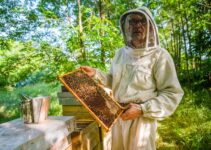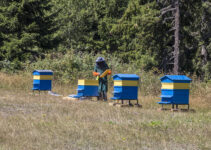Tennessee actively encourages its interested residents to become beekeepers because the authorities understand the importance of these pollinators to agriculture in the state. While participation is encouraged, beekeeping must be conducted within the bounds of the beekeeping laws in Tennessee, put in place to protect the industry and the pollinators themselves.
Tennessee has strict beekeeping laws to curb the spread of regulated bee diseases and pests and protect the agricultural and beekeeping industries in the state. Local municipal laws may limit beekeeping in certain property zonings but are not allowed to ban beekeeping without good cause.
Beekeeping laws in Tennessee are science-based and intended to protect the state’s local ecology and the agricultural and beekeeping industry. The laws also protect the rights of people to keep bees within the laws issued by the state and don’t allow municipalities to ban beekeeping except for safety or zoning reasons. Beekeepers must follow the beekeeping regulations in Tennessee to benefit from the protection of the law.
Laws For Keeping Bees In Tennessee
Tennessee, the state with the motto “Agriculture and Commerce,” is located in the southeastern part of the USA and has a strong agricultural sector. The state is divided into 3 main regions; East Tennessee, Middle, and West Tennessee.
Marked by diverse topography, the state has varying climatic conditions, from the Appalachian mountains with temperate forests in the east to the fertile Mississippi plains in the west.
Tennessee’s general climate is considered a humid subtropical, but the varying topography makes local weather conditions important for beekeeping. The summer season in Tennessee is generally humid and hot, but the winter season is mild to cool, making beekeeping possible all year round in parts of the state.
The Tennessee state authority is beekeepers is the Department of Agriculture, which regulates beekeeping activities. The government actively collaborates with the University of Tennessee in the establishment of regulations for beekeepers based on scientific evidence.
The active involvement of the state in beekeeping means that there are many opportunities for beekeepers in Tennessee, but the industry is also regulated to protect the local ecology, agriculture, and beekeepers.
Tennessee has a state Apiarist appointed to develop beekeeping laws and regulations and enforce the laws that are currently in place. The office of the state Apiarist is also responsible for hive and apiary inspections in the state.
The Tennessee governing authority offers grants to beekeeping associations in the state to appoint and pay for qualified association members to act on behalf of the state apiarist to perform inspections.
Must You Register Beehives in Tennessee?
All beehives in the state of Tennessee must be registered with the office of the state Apiarist. This requirement applies to a single beehive or an apiary site with multiple hives.
Each beekeeper is issued with a registration number that must be displayed on the beehives for identification purposes.
The forms to apply for registration, inspection requests, importation of bees and equipment into Tennessee, and other beekeeping-related activities can be sourced on the Apiary Forms page on the Tennessee Department of Agriculture website.
The registration must be renewed every 3 years to update the information on the state’s database.
Apiary registration is beneficial for the beekeeper as follows.
- Notifications regarding outbreaks of American Foul Brood (AFB). You will be notified regarding any outbreaks, allowing you to take precautions and inspect your own hives.
- Free hive inspections. If you are selling bees, moving hives, or suspect you have a problem in your beehives, you can request an inspection from the state Apiarist.
- Compensation for hive loss. Registered beekeepers with registered colonies will receive state compensation for hives that must be destroyed due to AFB or any other regulated disease or pest, as ordered by the state Apiarist. Beekeepers will not receive compensation for unregistered hives.
What Beehives Can You Use For Beekeeping In Tennessee?
Beekeepers in Tennessee are only allowed to use hives that have removable frames. The removable frames make hive inspections easier and quicker.
The reason for this regulation is to make the inspection job of the state Apiarist quicker and easier.
Can You Use Second-Hand Beekeeping Equipment In Tennessee?
A measure that the Tennessee Department of Agriculture has put in place to limit the spread of serious and contagious bee diseases is to restrict the use of old second-hand beekeeping equipment.
It is against the law to sell or give away old, used bee hives and equipment without prior inspection of the equipment by the authorities and following prescribed sanitation treatments. The general recommendation for treating used or old hives is to boil them in lye.
This treatment effectively destroys the wood fibers, rendering the hive unusable. So while it is technically possible to use old hives, it is not practical after the prescribed treatment.
Second-hand beehives that still have bees can be sold or given away, provided the relevant authority inspects the hive before it is relocated.
Regulations for Importing and Exporting Beekeeping Equipment In Tennessee
A permit must be requested to move any bees, beehives, and used beekeeping equipment into or out of Tennessee. A certificate of health must accompany the application to ensure the bees or equipment is free of dangerous bee diseases or pests.
This law also applies to the movement of any bee colonies sold within the state of Tennessee and includes the movement of any honey or bee food, such as bee candy, that may contain honey. Honey and honey products can harbor deadly bee viruses.
Liability Laws For Beekeepers In Tennessee
Beekeepers in Tennessee are indemnified of any liability for any damage or harm caused by bees, provided that the bees are kept according to current beekeeping norms and standards.
This means beekeepers cannot be sued for stings or bee-related problems if they have taken all the necessary measures to practice safe and responsible beekeeping.
Local Municipal Laws For Beekeeping In Tennessee
Local municipalities are not allowed to ban anyone in Tennessee from keeping bees if the hives and colonies are kept in a reasonable manner within the prescribed laws of the state.
The only time a municipality can ban beekeeping is if the bees represent a public nuisance or if the keeping of bees violates a property zoning ordinance.
You can research your local municipality regulations by contacting the city clerk’s office or selecting your region on the Municode website.
Beekeeping Associations In Tennessee
Beekeeping clubs and associations are a great way for beekeepers to remain up to date with beekeeping laws and regulations in Tennessee.
The Tennessee Beekeepers Association, or TBA, is the state beekeeping association with which regional and local bee clubs and associations become affiliated.
Beekeepers can join the TBA directly, but the association recommends that you join local clubs and associations for regional and local information regarding keeping bees.
The Tennessee Beekeeping Association maintains a list of almost 50 beekeeping clubs and associations across the state, making it easy to find a beekeeping community near you.
A local beekeeping association is the best way to learn about the general beekeeping laws and regulations specific to the area where you live.
These groups are also invaluable resources of information on the best practices for beekeeping in your area regarding available forage and local climate conditions.
Conclusion
Tennessee promotes beekeeping in the state but also has strict regulations to protect pollinators and beekeepers in the region. Most laws are intended to target and limit the spread of regulated bee diseases such as AFB and other bee pests.
The climate and agricultural activities in the state make Tennessee an ideal location to keep bees, especially considering the laws protecting beekeepers’ rights!
References
https://www.tn.gov/agriculture/businesses/bees/forms.html
https://stateoftennessee.formstack.com/forms/tda_apiary_inspection_request
https://www.tn.gov/content/dam/tn/agriculture/documents/apiary/2018/AgBusApiaryAct.pdf
https://library.municode.com/tn
https://extension.tennessee.edu/publications/documents/PB1745.pdf




